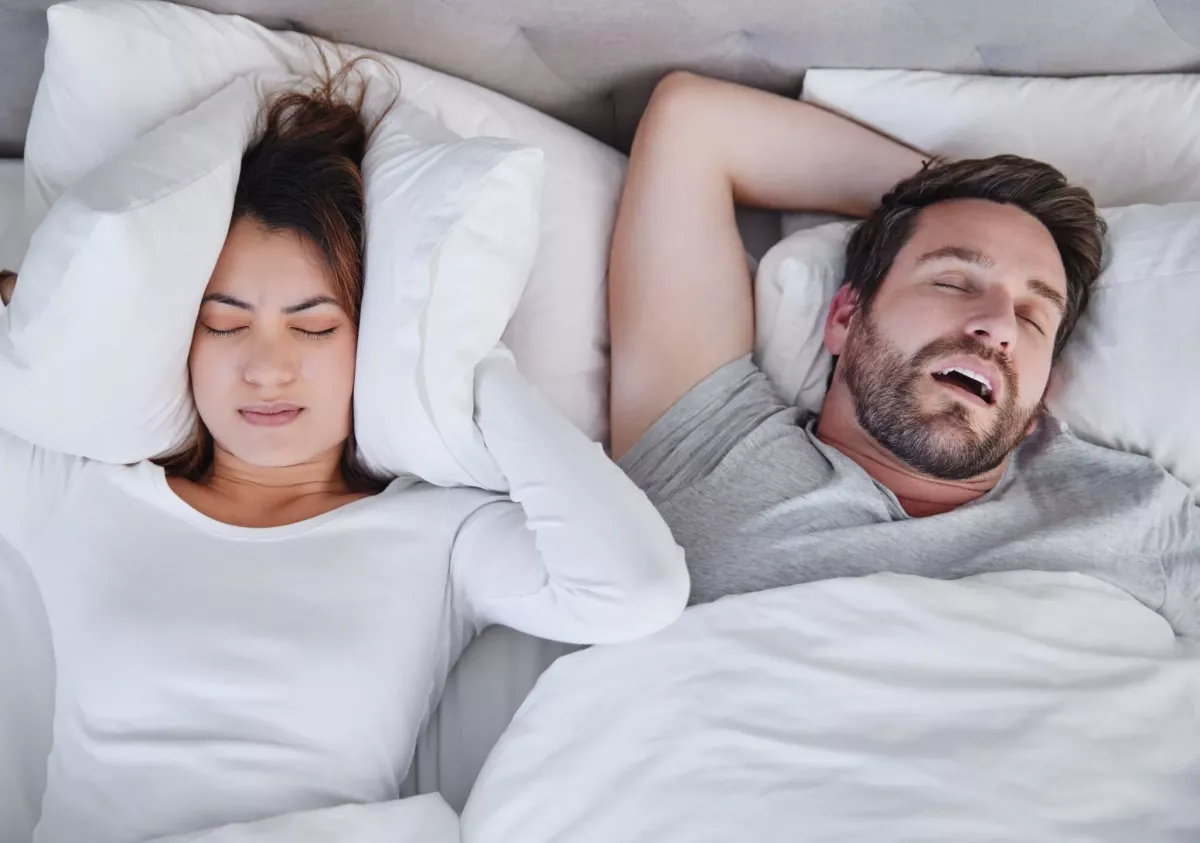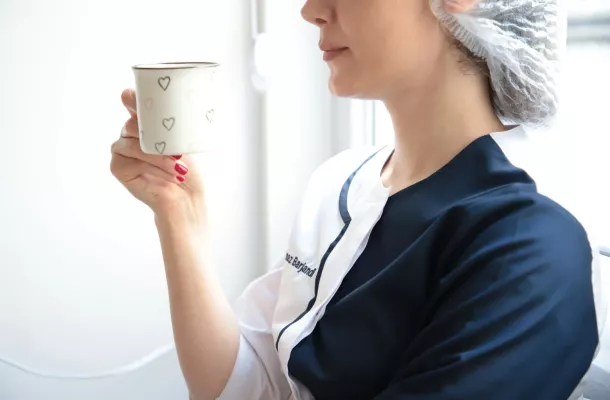
Heavy snoring followed by 10-20 seconds of interrupted breathing during sleep. This is the main symptom of sleep apnea, a nocturnal breathing disorder. In the long term, sleep apnea can increase the risk of high blood pressure and diabetes. How is sleep apnoea caused and what can you do about the breathing disorder? – Find out here!
What is sleep apnea?
Sleep apnoea is a nocturnal breathing disorder characterized by periodic, prolonged pauses in breathing during sleep. The person affected is often unaware of these pauses in breathing. With sleep apnoea, the upper airways collapse as a strong negative pressure is created when breathing in.
The pauses in breathing lead to a lack of oxygen, which causes a stress reaction in the body. The brain registers the pauses in breathing and releases adrenaline, which causes the muscles in the upper throat to tense and the airways to open up again. The alternation between closing and reopening during sleep is very stressful for the body and significantly impairs the quality of sleep.
Various factors promote this collapse. These include enlarged tonsils, a recessed lower jaw, a large tongue, regular alcohol and nicotine consumption and obesity.
Why can snoring be dangerous?
Symptoms range from heavy snoring and breathing interruptions of 10-20 seconds during sleep to a strong urge to urinate, heavy sweating and brief awakenings from sleep with shortness of breath. Those affected also report a dry mouth in the morning accompanied by pronounced tiredness, reduced performance and difficulty concentrating throughout the day as well as possible personality changes, depression and irritability.
The risks and secondary diseases associated with sleep apnoea are manifold and include high blood pressure, diabetes, male infertility and heart failure.
So how are breathing interruptions during sleep related to obesity?
Around 60% of all people who struggle with breathing interruptions during sleep are overweight or suffer from obesity. Sleep apnea is about four times more pronounced in overweight people than in people of normal weight. These abnormalities indicate a link between obesity and nocturnal breathing interruptions.
The reasons why people who are overweight are more frequently affected are currently being researched. However, there is very concrete evidence that overweight people often have a larger tongue, which can close the airways more easily. In addition, fat deposits in the throat area can press on the airways from the outside and thus impair breathing.
Overall, the clinical picture of sleep apnoea is a vicious circle. If a person is overweight, this increases the risk of nocturnal breathing interruptions. Sleep apnoea is in turn stress for the body. As a result, the stress hormone cortisol is increasingly released and the production of the happiness hormones dopamine and serotonin is suppressed. Sleep is no rest for the body in such a situation and the energy reserves cannot be recharged. In such cases, sleep is pure stress for the body. You feel drained and exhausted throughout the day. The body tries to obtain energy from food and signals “hunger” to the body. This results in increased food intake, which in turn encourages weight gain or makes it more difficult to lose weight. So it’s a vicious circle that needs to be broken!
How can losing weight and a healthy diet improve sleep apnea?
Weight reduction has been proven in numerous studies to be the most effective treatment method for sleep apnoea. A change in dietary habits and regular physical activity in particular have proven to be very effective treatments.
A study from Spain has now shown that losing weight is the most effective treatment for sleep apnoea. After a one-year weight loss program, most of the study participants no longer needed a breathing mask at night to help them breathe. This is due to the fact that with weight loss, the fatty tissue in the tongue and throat also decreases, which means that the airways are less restricted.
A healthy, wholesome diet can not only significantly improve the quality of sleep, but also reduce the risks associated with sleep apnea, such as high blood pressure and diabetes. Losing excess weight reduces the severity of sleep apnea, which in turn leads to improved sleep. The loss of fatty tissue that occurs as a result of the change in diet also leads to the loss of fatty tissue in the tongue and throat area. This allows the airways to widen again, which leads to an overall reduction in breathing interruptions during sleep. This relieves the body of the constant stress caused by breathing disorders at night, promotes better sleep, increases performance and accelerates weight loss success.
What can you do to stop breathing at night?
Sleep apnea and obesity can be significantly improved by making lifestyle changes and integrating exercise into everyday life. We recommend protein-rich meals, healthy plant-based oils and fats, moderate amounts of whole grain cereals and a high intake of vegetables, fruit, nuts and seeds. Low-calorie drinks and dairy products are also part of a successful dietary change. High-fiber foods contribute to a feeling of satiety and thus support weight loss. They are also very valuable for our intestinal bacteria.
It is advisable to limit the consumption of sweets and salty snacks to a maximum of one handful per day.
Is a gastric balloon useful for sleep apnea?
If you suffer from sleep apnoea and wear a gastric balloon, your balloon and your Weight Buddy will help you lose weight and change your diet. As soon as the first few kilos fall off, your sleep apnoea will also improve and you may no longer need a breathing mask at night. When the night-time stress caused by breathing interruptions subsides, your body will thank you with faster and more effective weight loss!
What else helps against sleep apnea?
In addition to weight loss through lifestyle changes, it is particularly important that acute sleep apnoea is treated immediately to reduce the risk of secondary diseases.
The options for immediate treatment of sleep apnea include a breathing mask with slight positive pressure to keep the airways clear or a dental splint to compensate for any misalignment of the jaw. However, the key to long-term improvement of the nocturnal breathing disorder lies in weight reduction and a comprehensive lifestyle change.
A look at daily habits is of great importance. Keeping regular bedtimes and providing fresh air in the bedroom are very important to improve the symptoms of sleep apnea. In addition, regular alcohol consumption and nicotine consumption in general should be avoided in the evening, as alcohol and nicotine can significantly worsen symptoms. It is advisable to avoid sleeping pills, as they can cause the throat muscles to relax at night.
The sleeping position also plays a role, as breathing stops occur more frequently in the supine position. It is recommended to sleep on your stomach or on your side.Special breathing training devices can be used to strengthen the muscles of the respiratory tract. Alternatively, singing or playing a wind instrument have also proven to be effective treatment methods for strengthening the respiratory muscles.
For anatomical causes, such as a lower jaw that is too small or too far back, a lower jaw splint can be helpful.This plastic splint is worn at night to push the lower jaw forward and thus keep the airways clear, which can prevent breathing stops at night.
How can you find out if you suffer from sleep apnea?
First of all, you can ask yourself whether you suffer from the symptoms mentioned above. If several of the symptoms apply, you may be affected by sleep apnoea.
For example, you can ask your partner if you snore (loudly) at night and possibly also have breathing interruptions during sleep from time to time.
There are now also helpful apps and fitness wristbands or smartwatches that can track your sleep and breathing noises. If you suspect that you suffer from sleep apnoea, it is a good idea to check your sleep in this way.
If you then notice that you snore heavily several times a night and your breathing stops every now and then during sleep, and that you are also exhausted and very tired during the day, I would strongly recommend that you see a doctor. You can discuss your symptoms and complaints with your GP. He or she can then confirm or refute the diagnosis with the help of a sleep apnea screening using a mobile sleep monitoring device. The device measures parameters such as breathing, body position, pulse and blood oxygen levels. If there are signs of sleep apnoea, a further diagnosis is made in the sleep laboratory to determine definitively whether you suffer from sleep apnoea.
Conclusion: breathing interruptions during sleep
We can therefore conclude that the interaction between sleep apnoea and obesity is a vicious cycle in which being overweight increases the risk of breathing stops, which in turn causes stress for the body. Weight reduction and lifestyle changes are the most effective treatment options for sleep apnea. This can also reduce the risk of secondary diseases such as high blood pressure or diabetes. A healthy change in diet and regular physical activity are the key to success. Your gastric balloon and your Weight Buddy can provide you with optimal support in your weight loss and thus also in improving your sleep apnoea!
Sources
Carneiro-Barrera A. et al.: Effect of an Interdisciplinary Weight Loss and Lifestyle Intervention on Obstructive Sleep Apnea Severity: The INTERAPNEA Randomized Clinical Trial. JAMA Netw Open. 2022 Apr 1;5(4):e228212. doi: 10.1001/jamanetworkopen.2022.8212.

So many different things influence our metabolism and our weight: stress, illnesses, medication and the yo-yo effect are just a few aspects. Losing weight can be quite frustrating! But there is a way out for everyone! As a nutritionist at My Weight®, I support my patients individually and personally on their way to their desired weight. Losing weight can and should be fun...and we work on this together!
Julie - Weight Buddy® and nutritionist at My Weight®

 English
English  Nederlands
Nederlands  Deutsch
Deutsch 


